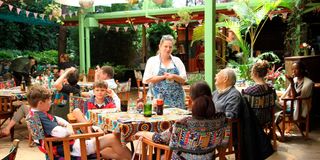Premium
How Kenyans received King Charles’ coronation

Emma Forbes, owner of Under the Swahili Tree restaurant in Karen, engages some of the guests who went to watch the coronation of King Charles and Queen Camilla.
When I heard that the Karen restaurant, Under the Swahili Tree, was putting on a fish and chips lunch and a screening of the coronation of Charles and Camilla last Saturday, I booked a table.
I guess my interest was more in ‘people watching’ than in the event itself. Would any Kenyans be watching? But, as it turned out, I was fascinated by all the pageantry and the precision on display. There were 4,000 military personnel on parade; there were 90 heads of state in Westminster Abbey.
There were also many thousands of spectators lining the streets – some who had been camping out for the night, or even for a number of nights, so that they could secure good viewing points. This was despite the forecast of rain. And it did rain.
I reckon that made it more of a typical British event. My wife and I brought a book of photographs of Britain in the rain, when we came to settle in Kenya in the mid-1980s. We said we would look at it if ever we got nostalgic about our previous lives in Europe. We have never had to look at it.
At the restaurant, though most of the tables had filled up by 1pm, only a few Europeans seemed at all interested in the Coronation. There were a number of Kenyan families, especially at the garden tables, and their attention was more on their children having fun in the bouncy castle.
I was with Peter Kamau who had driven me there. I asked him whether many Kenyans would be interested in the Coronation. He said very few would see it as significant for them – except for some of the older generation, and especially those who had studied in the United Kingdom. I was not surprised.
For me, I was struck by the way things have changed since I was watching the last Coronation in 1953 – the Coronation of Charles’ mother, Elizabeth II. She had ascended to the throne because her uncle, Edward VIII, was forced to abdicate because he wanted to marry a divorcee, the American, Wallis Simpson. On Saturday, Camilla, a divorcee, was crowned as the Queen Consort. I noticed that the BBC commentators were calling her, simply, the Queen.
Ten or more years ago, Camilla was perhaps the most hated woman in Britain. The very popular Princess Diana had said Camilla was the third person in her marriage to Charles. But, gradually, the public’s view of Camilla has changed. Perhaps because it is clear that Charles and Camilla are a genuine couple, with both of them interested in the same things – and doing things together.
Another interesting factor is the dramatic change in British society. In 1953 Britain was not the multi-racial, multi-faith country it is today.
The coronation had ceremonies that go back many centuries, but it also involved people of different faiths with Sikhs, Muslims and Jews taking on special roles. Charles sees himself as the Defender of Faiths, not as Defender of the Faith.
The signs are that he will be a reforming monarch. But he will have the tricky job of keeping a balance between maintaining traditions in the interests of continuity and making changes in the interest of being relevant to younger generations.
But back to the restaurant. The fish and chips were excellent – though not doused in vinegar and wrapped in newspaper as I remember was the style when I was a youngster. But the trifle was much like my mother made whenever there was a special occasion.
We had a chat with Emma Forbes, the owner/chef of Under the Swahili Tree. When working as an art teacher at the coast, she made herself familiar with coastal cuisine. She told us that on the evening of 18 May she will be having a Swahili Food and Wine Pairing. The menu hasn’t been published but I can tell you it includes lobster! If you are interested, you can ring 0110 509778.
- John Fox is Chairman of iDC Email: [email protected]





